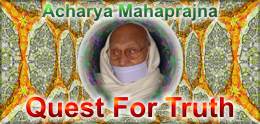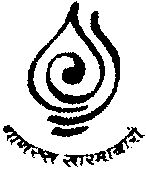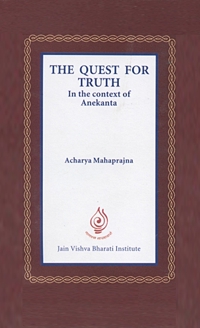
The souls are a bottomless pit (akskaya-kosha). This is the vegetable kingdom. There are infinite numbers of souls in them. There is one category of vegetation called vyavahara rashi (set of transmigrating souls). In that there are many, many souls that have not ever developed. They have been in the same state from primordial beginning. With the coming together of all the factors of time, destiny and karmas, a soul leaves that abode and comes into the category of vyavahara rashi. Here its development begins. They develop from one sense organ to five sense organs and reach the state of man. The souls in the avyavahara rashi remain undeveloped and those of vyavahara rashi develop. Vyavahara rashi is a small drop while the avyavahara rashi is like an ocean, an ocean that has no shores. There is no language, consciousness, memory, imagination and no means of expression in a vyavahar rashi. In vyavahar rashi, there is language, consciousness, memory, imagination and the tools to express. The strength of the soul is uniform. The same strength that the soul of avyavahara rashi has, the soul of a vyavahara rashi also will have. There is no difference in their strength. The difference is only in their manifestation.
In the soul of the avyavahar rashi only one aspect of consciousness is manifest. That is the capacity to feel. The beginning of our world is in language. If there were no language there would have been no communication, no interaction. With language comes communication and interaction. As soon as we crossed over from avyavahara rashi to vyavahara rashi we gained language, the organ for taste developed. This organ performed both the jobs of speaking as well as relishing food. The second aspect of consciousness came into being. The moment we began speaking and enjoying food we entered the world of vyavahar or interaction. We have come into vyavahar rashi and so are in a position to give expression to our consciousness. In a vyavahar rashi we were not in a position to do so. The moment we came into vyavahar rashi we started knowing that we too have an existence. I too am. To assert one's existence language used its potency. We became beings with two senses.
Now the source of development had opened within us. We began to know the social world more closely. We got one more aspect of consciousness. We began experiencing the sense of smell. We became endowed with three senses. We learnt to establish relationship with the outer world through smell. We found that flowers have fragrance. Not only flowers, even man has a scent. There is nothing in this world that does not have a certain smell. We went even further.
The third aspect of consciousness manifested itself and we were able to see the world, see the colours and see the forms. We were wonderstruck. How many things! How many forms! How many shapes and how many types! We became beings with four senses. Our steps towards progress moved forward. We got the power of hearing. We began to hear. In the first stage of interaction in the world we began to speak and only in the fourth stage of interaction did we learn to hear. In this stage we began to exchange words. Now our connections with the world were fully established. We became beings with five senses. The windows of our consciousness were opened and all five aspects of our consciousness had flowered.
There are infinite aspects to the sun of consciousness. Of them five have been obtained by us. In our kendras or psychic centres there is light but it is concealed by a curtain, which prevents the light from being emitted out. As we move the curtain and come out, the light in our psychic centres begins to radiate. Once the process of development begins, it cannot be stopped. It keeps moving ahead and beyond. As we progressed we opened one door. In the beginning we had opened only the window, now we have opened a door. We became organisms with a mind. The mind is a very big door. The senses are small windows. I see a man standing before me. The eyes saw. Their function is over. What was he before? The eye does not know. What will he become? The eye still does not know. The job of the mind is to know the past and the future. It knows the past and present also. The senses know only the present. The mind knows the past, present and the future. The mind's job is to collate the knowledge acquired by the senses. 1, 1, 1 - add a comma to every part and each of them will remain separate. Only without the comma can it become eleven or one hundred and eleven. It is the mind's job to add. It derives from the past, changes the present and tries to bring the future into its purview. He recollects the past and imagines the future. Our world has developed on the basis of recollection and imagination.
When the mind and intellect developed man asked, "Who am I? Who is it before me?" The search for reality began. That quest led us to the discussion on the soul and the supreme soul. When the mind and intellect were not with us then there was no discussion on the soul and the supreme soul. That was a world devoid of discussion. In the world of discussion we asked questions: few to ourselves, many more to others. We got answers for them, few from ourselves and more from others. Our consciousness is not so well developed that we can go deep into spirituality and ask ourselves for the answers, that we can find the answers on our own. The right solution is to ask ourselves. The one who looks for solutions within oneself finds them. The one who wants to get solutions from others treads a difficult route.
A young man went to a Buddhist. He was a great spiritual practitioner. The young man asked, "Lord! Who am I?" The Buddhist slapped the boy and said rudely, "Go away, you stupid fellow!" The young man was shocked. Such a great practitioner, such a great intellectual and when I asked him a small question, he gave me a slap! He went to another spiritual practitioner and said, "Lord! I went to Bodhidharma and asked a question. He did not answer me, he only slapped me." This monk replied, "Oh, Bodhidharma slapped you on asking that question! I would have beaten you with a stick." The young man could not understand anything. He went away in bewilderment. The second day he went again to the Bodhidharma and said, "Lord, I asked you a question. You never answered; instead you gave me a slap. Is this a manner of replying? What did you do?" Bodhidharma said, "Do not bring that up again. Yesterday I slapped you; today I do not know what I will do." The youth trembled and said, "What should I do?" Bodhidharma said, "You are stupid." The boy asked, "But why?" Replied Bodhidharma: “That which you should ask yourself, you are asking others. That is why you are stupid. Go and ask yourself, who am I." The matter came to an end and the boy had found a solution.
 Acharya Mahaprajna
Acharya Mahaprajna


